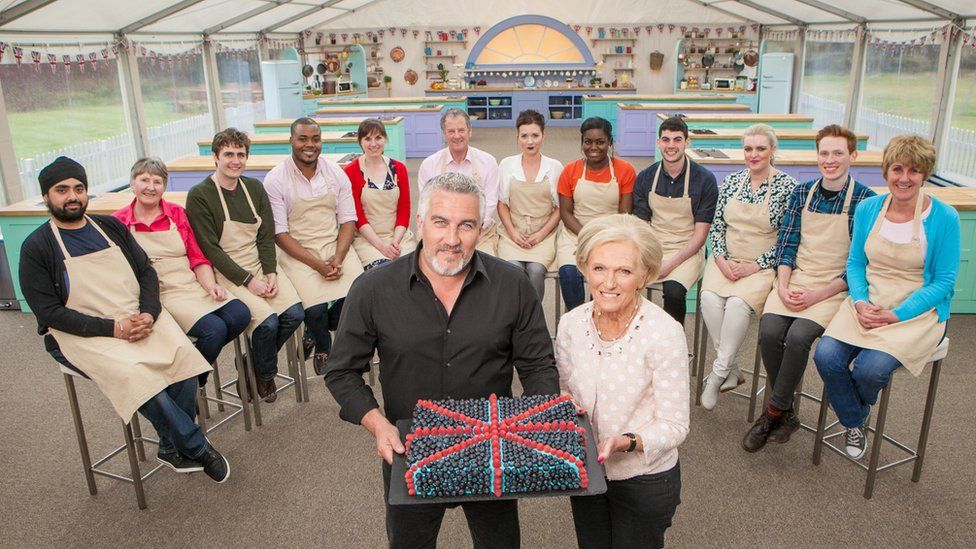Why did The Great British Bake Off move to Channel 4?
- Published

There are many reasons to love The Great British Bake Off, but if you're an advertiser it has something very few programmes can offer: Five million viewers under the age of 34.
For a programme aimed at a channel whose viewers have an average age of 62, and featuring a judge in her 80s, this is more than remarkable.
Bake Off was described as "quintessentially BBC" by the corporation and its formula, in which nice people cope with some mild pastry-related jeopardy, contradicts almost every expert opinion about what young people want to watch.
The BBC's other big ratings warhorse, Strictly Come Dancing, has a two-to-one split between those over and under 45. Bake Off is one-to-one.
Who would have dared say 10 years ago that the way to reach "Millennials" was baking?
So, it's no wonder that a rival broadcaster has swooped. That demographic is marketing catnip.
'Power shift'
The company that makes the programme, Love Productions, says it's not just about money, but money certainly played a part.
The BBC's guidelines on how much of its licence fee it is willing to pay for a factual programme like the Bake Off has an upper limit of around £300,000.
In the end the BBC offered £500,000 an hour for 30 hours of programming, totalling £15m.
It was £10m too little.
There are also other issues. In the past both Jamie Oliver and Michel Roux found life easier on Channel 4, thanks to the BBC's rules on commercial activities. A move to Channel 4 will open up a wider range of money-making ventures for Bake Off's creators.
For example: The BBC, under pressure from the Government, recently curtailed its commercial activities when it came to recipes. Channel 4 faces fewer such pressures.
The problem for Channel 4 is preserving the magic formula. Just as no-one would have predicted the success of the original programme, no-one can be sure if the public will stay with the show. TV history is littered with examples of presenters and programmes that have collapsed like a souffle after switching sides.
Secondly, it is clear the presenters had no idea that the programme was going to move to Channel 4. The network says it does not want to change the format in any way but that will now be a matter of negotiation. That then takes us on to a third point - summarised by a former chief executive of Channel 4, Lord Grade.
Lord Grade says Channel 4 "shot itself very seriously in the foot" buying Bake Off
"Channel 4 has shot itself very seriously in the foot," was his comment on Tuesday.
His concern is that the broadcaster is in the midst of its own battle with the government in which it is fending off the threat of privatisation. One of its core arguments is that it is a developer of new shows, a place that gives the public output that other broadcasters avoid.
Snaffling a much-loved programme from the BBC and promising to leave it intact is something that he feels undermines that argument. Whatever Channel 4 now does, the conversation will revolve around the Bake Off.
But of course, this not just a battle between channels. It's a reflection of how much TV has changed over the years.
The Great British Bake Off may feel "quintessentially BBC" but it is the product of a firm that is 70% owned by Sky, part of Rupert Murdoch's broadcasting empire.
The other big food programme on BBC One is Masterchef, again a Murdoch product, via his 50% ownership of production company Shine.
The BBC owns and reaps the rewards for a number of programmes such as Strictly Come Dancing, Top Gear and Doctor Who but it is also obliged to buy a lot of its output from independent producers.
That other midweek ratings winner for the BBC, The Apprentice, is a US-owned product made by a firm called Boundless, which is part of the RTL group.
There has been a shift in global power from channels to the international production companies who place their programmes wherever they can make the best return and it is a process that's only going to continue if audiences for the big traditional channels continues to decline.
Follow us on Twitter @BBCNewsEnts, on Instagram, or if you have a story suggestion email entertainment.news@bbc.co.uk.
- Published13 September 2016